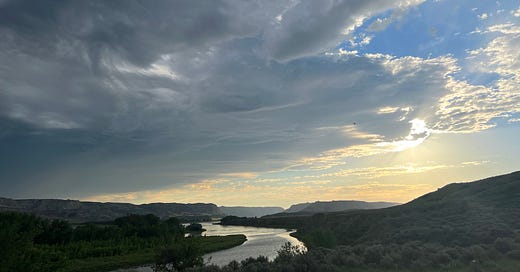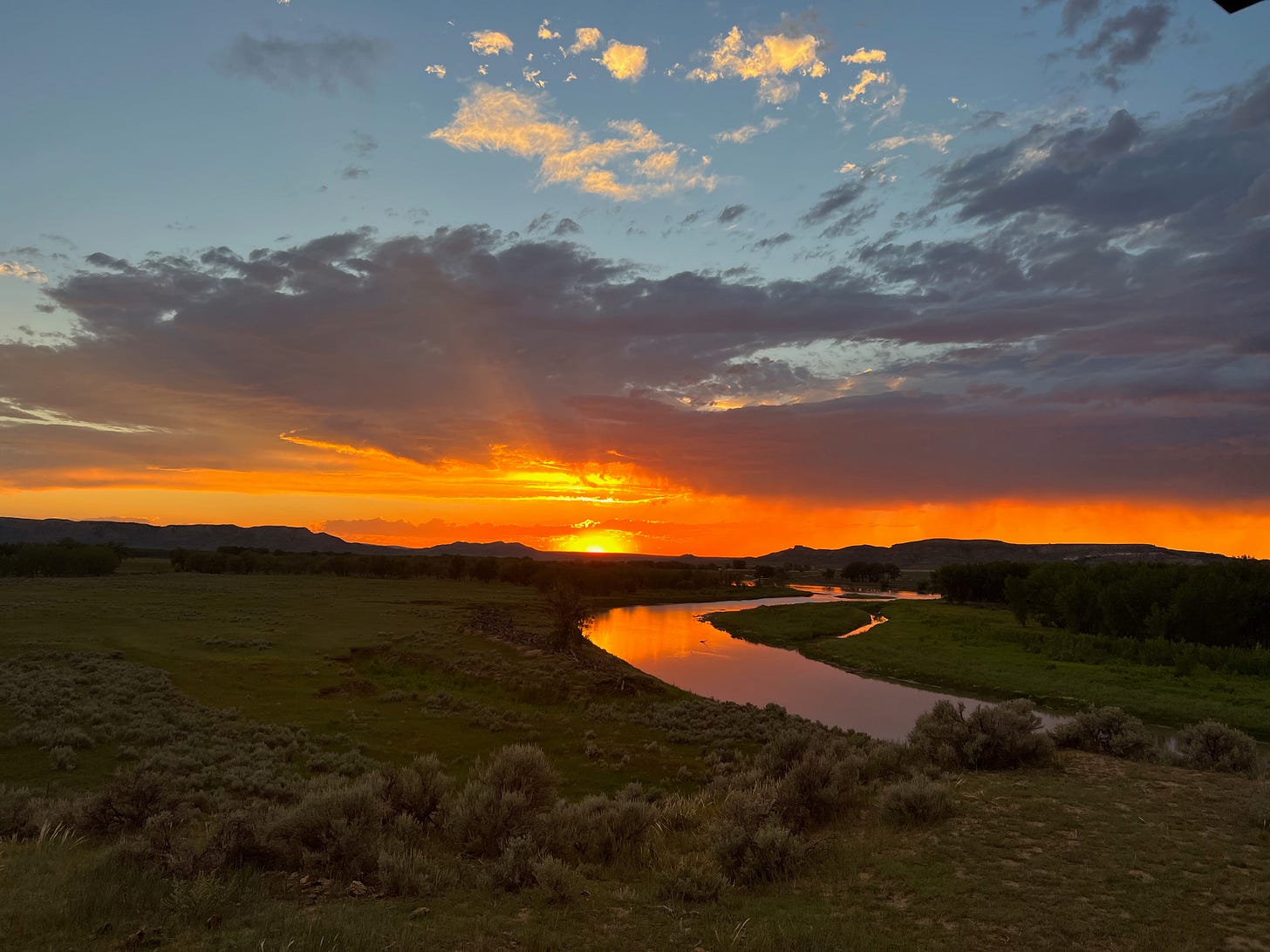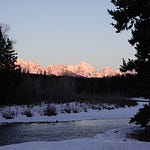Just over a minute of birdsong at American Prairie (which recently changed its name from the American Prairie Reserve), including the western meadowlark, one of the loveliest birds I ever hear. This audio pairs with the photo below—the slight rumble of thunder toward the end of the recording comes from the early-morning thunderstorm almost overhead.
“She was no longer seeking the truth, her journey had become a desperate hunt for a turning point.” —Eyes of the Rigel, Roy Jacobsen
This morning, after a few days of a deep funk, I forced myself outside for a long walk alone. I ended up among the trees of an in-town nature preserve that a local artist had left to the city when he passed away.
When I saw the story in the paper several years ago about the acreage he’d left to be used for open space, I was a bit skeptical. Not of his gesture, which was heartfelt, but my town has under 8,000 people and forested public-land mountains and millions of acres of wilderness in several directions. I wasn’t sure we needed more in-town open space. But I’ve found myself on those four acres more frequently than I could have imagined, thinking of the artist and what he must have felt for his community to leave it that land for all to use. And how the city’s parks staff have nurtured the trees and kept the paths and how restful it all is. It’s a respite, even in a place that it feels like it must have no shortage of such things. The traffic is muted and the trees seem to chat to you in a friendly way as you wander around, hoping to avoid bears looking for unattended apples.
Part of the funk came after the local area was inundated for over a week by attendees to an enormous music festival that a local landowner and festival organizer started just a few years ago. It attracts tens of thousands of people, from the counts I’ve heard, far more than our local towns can accommodate right in the middle of the busiest part of tourist season. Last year several downtown restaurants closed because they couldn’t handle the onslaught; this year some coffee shops followed suit. Last year our cell phone service was almost unusable for a week, and while a temporary fix was meant to have been in place, the same happened this year. Downtown gets trashed, and this particular cohort of visitors seems to feel entitled to higher levels of service with lower levels of price. It’s another level of an already unsustainable model of tourism.
These things don’t directly affect me since I don’t work in the service industry and can stay home most of that week. But they directly affect several members of my family in addition to the entire community. By all accounts the organizer is a perfectly decent person—who has failed for several years to work with local communities by asking them how to make this event a benefit for all rather than a drain on the quality of life and even the economy of the area. Like, say, holding it at a different time of year when other business is slower. Nothing we do happens in a vacuum; all our choices and actions affect others, no matter how much one might want to pretend otherwise.
The concert is over, everywhere is still understaffed, housing continues to be astronomically expensive, and everyone everywhere is still just trying to get through each day.
The festival reminded me, somehow, of both the Copper Kings who built Butte—building their own wealth most of all—while destroying its land and many of its people, and (rather randomly) of the cities I’ve been to that have invested millions to host the Olympics only to be left years later with partly-filled hotels and unused stadiums.
It’s such a contrast, these two pieces of land and the people who’ve owned them. One inflicts drain and damage on the community couched in leisure and (supposedly) contributing to the economy. Much of the damage caused by for-profit commodification is done in the name of supposed economic benefit. The other asked little and in the end gave all he had so the rest of us could find solace and peace.
Humanity has watched these cycles, and tried to survive them, for millennia.
How do we resolve these conundrums, slow and maybe stop the cycles? I don’t know, but maybe I’ll meet an answer someday sitting under the aspen and apple trees that someone nurtured throughout his life and then left as a gift to us all to care for in turn.
Bonus photo: Sunset over the Missouri River
Some stuff to read, listen to, or watch:
A wonderful, in-depth piece by Tait Sougstad about LandTrust.com, the “Airbnb for ranch lands,” in Montana Free Press. I particularly appreciated the effects on and comparisons with the Block Management hunting program, which opens private property to public hunters without charing them (us) a fortune: “‘The way forward is trying to restore cooperation between hunters and private landowners — helping build relationships,’ he said. Block Management is a good program, he said, but he thinks the ability to sign in to a property without interacting with the owner has led to hunters taking access for granted, and not having a personal stake in maintaining good relationships.”
An uplifting 30-minute documentary, Fools & Dreamers: Regenerating a Native Forest, about the work of botanist Hugh Wilson in New Zealand.
Jonathan Stalls, whom I interviewed for my book on walking, is coming out with his own walking book, Walk, next month, and was on Talking Headways to talk about it and his #pedestriandignity work on TikTok: “How can I as an artist channel honestly some of the rage that I feel, the absolutely outrageous reality that a pedestrian can’t safely navigate practical spaces?”
I got really into this short 5-part series “The Extortion Economy” from MIT Technology Review about computer viruses and ransomware, starting with the cyberattack of Colonial Pipeline in 2021. Really fascinating stuff about how businesslike a lot of hacking companies are and how they function.
There have been a number of good episodes on the Futures podcast recently. Isabel Millar talking about artificial intelligence and psychoanalysis went to some very surprising places.
Giulio Boccaletti writing “Dancing with water” in Aeon, about humans’ struggle with drought and flood and what we can learn from Japan’s relationship with water. (His book Water: A biography is on my enormous to-read pile for the “water” chapter of No Trespassing.)
Longtime readers will know of my passion for mathematics and math education that actually invites people in rather than obscuring the beauty and realities of what math symbolism means. Which is why I enjoyed coming across this 1910 book Calculus Made Easy, by Sylvanus P. Thompson: “The fools who write the textbooks of advanced mathematics—and they are mostly clever fools—seldom take the trouble to show you how easy the calculations are. On the contrary, they seem to desire to impress you with their tremendous cleverness by going about it in the most difficult way.”













Share this post